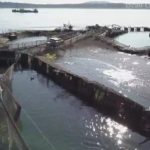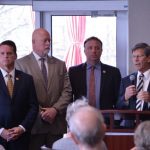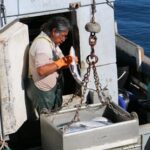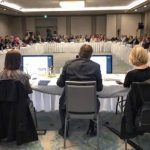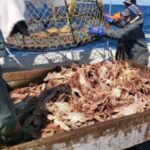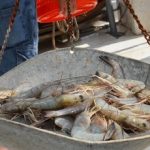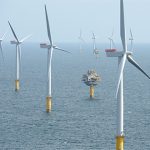My name is Sam Parisi I am a proud third generation Fisherman from Gloucester, Massachusetts.
My name is Sam Parisi I am a proud third generation Fisherman from Gloucester, Massachusetts.
My involvement in the fishing industry spans well over fifty years, and sadly, I have never seen our fleet, our shore side infrastructure in Gloucester, and New England in the alarming position it is at this moment. This is the result of unacceptable mismanagement of our fishery at the hands of the NOAA/NMFS bureaucracy, which is expanding.
Ten years ago Gloucester had around two hundred fishing boats. Today, there are about sixty.
While our fleet has dwindled, NOAA has increased their work force tenfold plus, and has rented three times more space at the expense of the tax payer.
One would ask, why the increase in bureaucratic positions if there is regulatory destruction of the fishing fleet and its shore side supporting infrastructure?
Another question deserving an answer is why is collaborative research not included in fish stock assessments?
NOAA’s Northeast Fishery Science Center utilizes data exclusively supplied by the Research Vessel, R/V Bigelow, which has turned away from traditional surveys to Eco-based surveys. This was revealed at the Georges Bank Yellowtail Flounder Working Group Meeting May 23, 2012, in New Bedford, Ma.
The survey determines abundance of fish stocks are in the ocean and what the total allowable catch of cod, haddock, flounder, and other species are available to catch.
The Agency, utilizing the law of the Magnuson Stevens Act, dictates that this is the “Best Available Science”, while excluding independent research, and collaborative science.
With so much on the line for this industry, it is a travesty that fishermen’s observations are ignored, which are completely contradictory to what the Agency is claiming, and setting catch limits that are destroying the family owner operated fishing operations in New England.
Another troubling issue is the at-sea monitoring program.
At this present time, New Hampshire Fisherman David Goethel, and Fishery Sector 13, a nonprofit entity representing fishermen from Massachusetts to North Carolina, are suing the U.S. Department of Commerce.
Until now, NOAA/NMFS covered the cost of this program, but is shifting the cost to these fishermen.
The fishing industry is the only industry in the country being forced to pay for government oversite by the regulators doing the best they can to drive them out of business
t is absolutely ludicrous to expect these struggling fishermen to pay $800.00 dollars per day when the airlines are not expected to pay the TSA, or, any other private business in this country is expected to pay for government oversight.
This industry is the most regulated industry in the nation today, which leads me to the The Saltonstall-Kennedy (S-K) Act of 1954, funds, which were created to provide consistent funding for commercial fisheries research and development. Funds are derived through the permanent appropriation of a portion of fishery import duties, which are estimated to be in the range of 92% in 2016.
NOAA is in charge first of picking the advisory panel that reviews the grant applicants and grade them. The agency chose experienced panelists from various regions.
Fishermen are at a disadvantage in the grant application process that sees a disproportional amount of academic groups seeking funding for various projects and have a distinct advantage in the grant writing process as they are constantly chasing grant money from various sources to support their projects, whatever they may be.
The S-K funds should be directed to the fishery, as was the intent. It is time for our representatives to discuss the S-K funds, and the use of the funding in the US Congress. These funds should not be used under any circumstances as income to support NOAA’s budgetary fodder.
It’s beyond time for transparency.
Senator Dan Sullivan, R-AK, has introduced a bill (S. 3087) called the “American Fisheries Advisory Committee Act”. A bill to establish the American Fisheries Advisory Committee to assist in the awarding of fisheries research and development grants and for other purposes.
Not later than 90 days after the date of the enactment of the American Fisheries Advisory Committee Act, the Secretary shall establish five regions within the American Fisheries Advisory Committee.
Section 2(c)(3) of the Act of August 11, 1939 (15 U.S.C. 713c–3(c)(3)), is amended to read as follows:
No application for a grant under this subsection may be approved unless—(A)the Secretary is satisfied that the applicant has the requisite technical and financial capability to carry out the project; and (B)the application is selected for funding by the American Fisheries Advisory Committee under subsection (f).
I implore you to contact the US Secretary of Commerce and ask her to support Senator Sullivan’s bill.
In closing, there are many issues facing our Gloucester fishermen, and fishermen from every region of our country, and these issues raised, are just scratching the surface.
The next big issue we face is the reauthorization of the Magnuson Stevens Act.
My name is Sam Parisi, Proud to be a Fisherman
Thank you

































